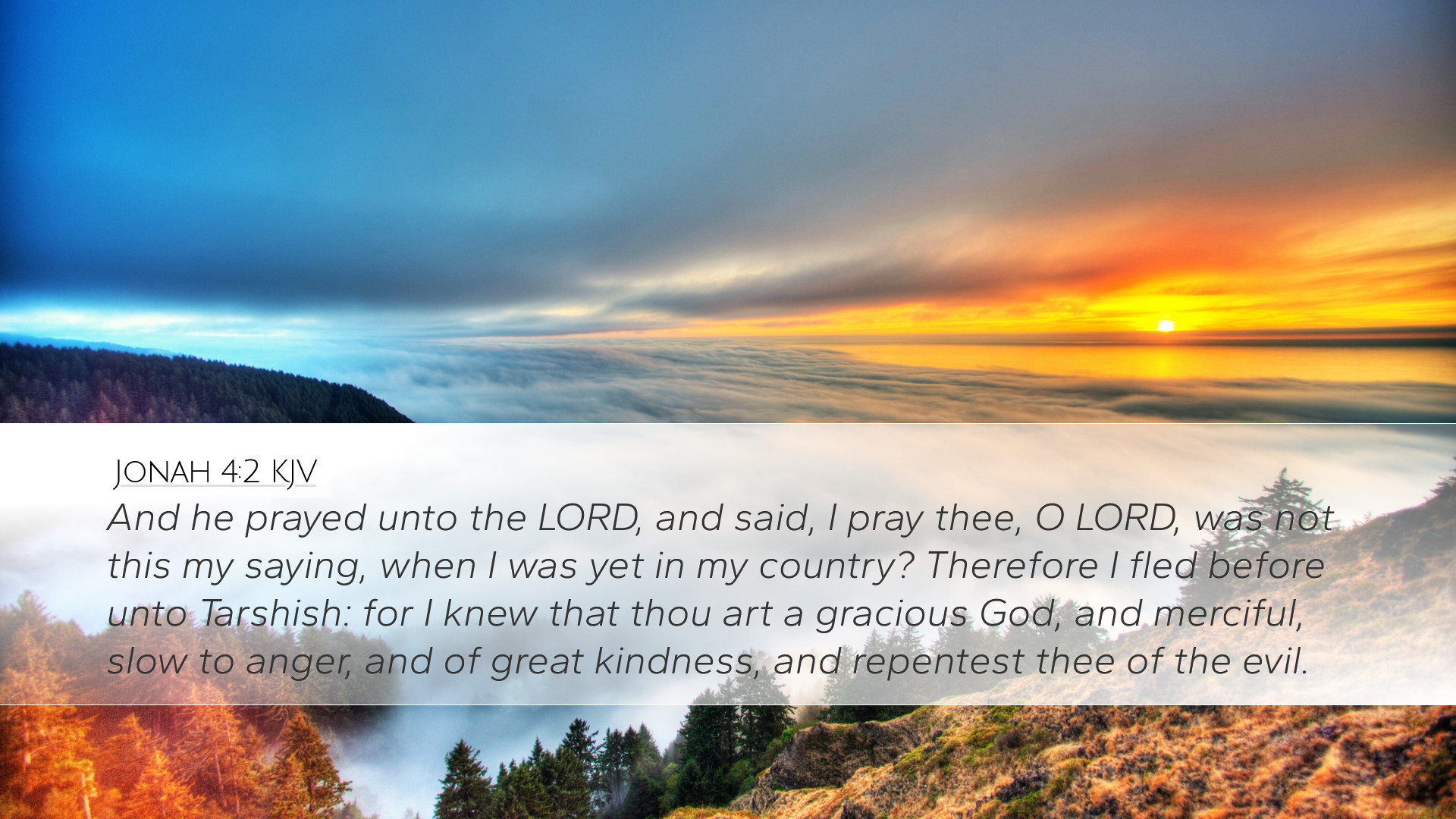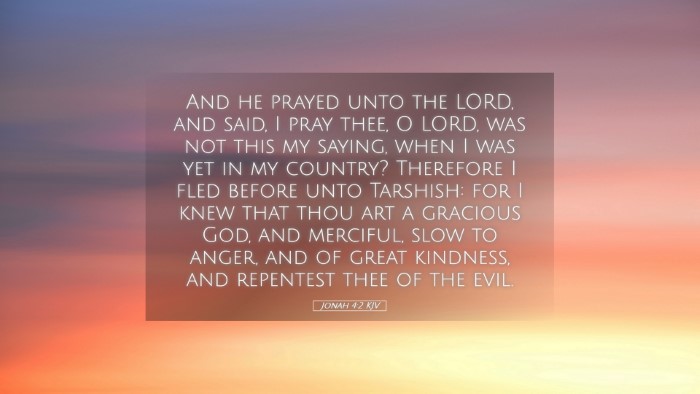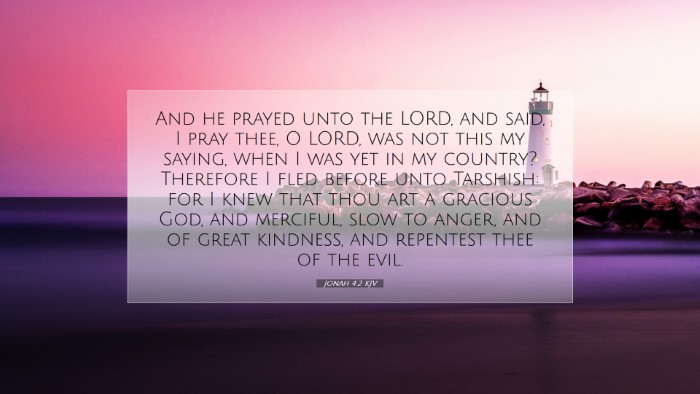Old Testament
Genesis Exodus Leviticus Numbers Deuteronomy Joshua Judges Ruth 1 Samuel 2 Samuel 1 Kings 2 Kings 1 Chronicles 2 Chronicles Ezra Nehemiah Esther Job Psalms Proverbs Ecclesiastes Song of Solomon Isaiah Jeremiah Lamentations Ezekiel Daniel Hosea Joel Amos Obadiah Jonah Micah Nahum Habakkuk Zephaniah Haggai Zechariah MalachiJonah 4:2
Jonah 4:2 KJV
And he prayed unto the LORD, and said, I pray thee, O LORD, was not this my saying, when I was yet in my country? Therefore I fled before unto Tarshish: for I knew that thou art a gracious God, and merciful, slow to anger, and of great kindness, and repentest thee of the evil.
Jonah 4:2 Bible Commentary
Commentary on Jonah 4:2
Verse: Jonah 4:2 - "And he prayed unto the Lord, and said, I pray thee, O Lord, was not this my saying, when I was yet in my country? Therefore I fled before unto Tarshish: for I knew that thou art a gracious God, and merciful, slow to anger, and of great kindness, and repentest thee of the evil."
Introduction
The book of Jonah highlights not only the prophet's mission but also his complex character and relationship with God. Jonah's lament in this passage reveals profound insights into his understanding of God's nature and the theology of compassion. This commentary blends insights from Matthew Henry, Albert Barnes, and Adam Clarke, aiming to elucidate this significant verse.
Exegesis of the Text
In this verse, Jonah directly addresses God, revealing his motivations for fleeing to Tarshish. He articulates a deep concern about God’s mercy and forgiveness, suggesting that his disobedience was rooted in a fear of God's grace being extended to those he deemed unworthy.
Contextual Analysis
To fully grasp Jonah's reaction, we must consider the historical context. Nineveh was the capital of Assyria, a nation known for its brutality against Israel. Jonah's reluctance to preach to them stems from a nationalistic and ethnocentric perspective, which many scholars note as a significant theme in the narrative.
The Nature of God
God's Graciousness
Jonah’s description of God as “gracious” and “merciful” is a reflection of the character of God throughout Scripture. Henry notes this graciousness is not arbitrary but is always coupled with justice. God's mercy does not absolve wrongdoing; instead, it offers an opportunity for repentance.
Slow to Anger
Jonah emphasizes God’s slowness to anger, echoing Exodus 34:6. Barnes posits that this attribute of God serves to highlight His patience and readiness to forgive those who seek His mercy. Jonah's lamentation reveals his misunderstanding of God's grace, suggesting that he loved God’s justice but hated His mercy.
Implications for Jonah's Character
Fear of God’s Mercy
Jonah's fleeing represents not merely a desire for personal safety but a deeper theological conflict. Clarke interprets Jonah’s flight as indicative of his unwillingness to see God's compassion extended to Israel's enemies. His fear was not of the physical journey but of the moral and theological implications it carried.
Emotional Landscape
This passage reveals the emotional turmoil within Jonah. He feels justified in his actions due to a strict interpretation of justice. However, this internal struggle showcases the difficulty of aligning personal beliefs about justice with God’s expansive grace.
Theological Reflection
Jonah 4:2 raises critical theological questions about the nature of God's grace towards all people, regardless of their past actions. This moment in Jonah’s narrative invites readers to reflect on their understanding of who is deserving of God's mercy.
God's Repentance
Jonah states that God "repentest" of the evil intended for Nineveh. This portrays God as responsive to the repentance of humanity, and Henry notes this illustrates the dynamic relationship between divine sovereignty and human free will. God's readiness to change His course in light of human repentance challenges rigid theological frameworks.
Pastoral Applications
For pastors, Jonah 4:2 serves as a compelling reminder of the challenge of extending love and grace to those whom we might consider undeserving. It encourages congregational reflection on their biases and the limits they place on God’s grace.
- Embrace of God's Compassion: Encourage congregants to embrace God’s compassion for all, leading to a transformative understanding of grace.
- Confronting Personal Prejudices: Foster discussions on personal prejudices and how they impact the church’s outreach and mission.
- God as a Relational Being: Emphasize God’s desire for relationship and openness to change in response to our prayers and actions.
Conclusion
Jonah 4:2 encapsulates a deep theological truth about God's nature and the human experience of grappling with grace. Through the lens of public domain commentaries, we see Jonah as a complex figure, embodying the struggle between justice and mercy. This passage encourages readers to reflect on their own understanding of God's grace and consider how they can more fully embody that grace in their own lives.


